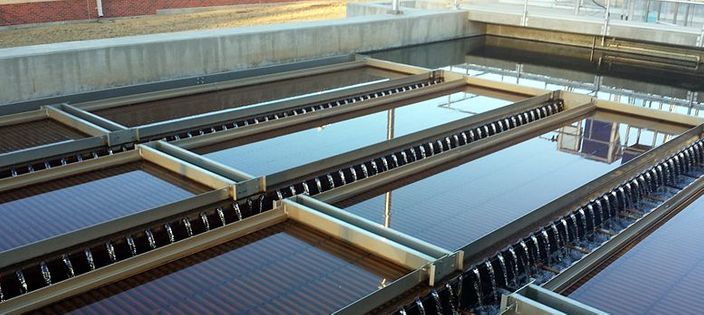Fort Smith agrees to $800,000 settlement offer on consent decree penalties
by September 5, 2023 8:40 pm 4,111 views

The Fort Smith Board of Directors on Tuesday (Sept. 5) approved a resolution accepting consent decree stipulated penalties settlement with the U.S. Department of Justice (DOJ) and Environmental Protection Agency (EPA) of $800,000.
On Aug. 25, 2022, the City of Fort Smith received a formal demand from the DOJ on behalf of the EPA, for stipulated penalties in accordance with Section XII, Paragraph 115 of the 2015 Consent Decree. The request was for $2.5 million for penalty demand for hundreds of sanitary sewer overflows (SSOs) between January 2, 2015, and June 30, 2021; a handful of treatment violations of the City’s NPDES Permits for both P Street and Massard Water Reclamation Facilities; and the city’s failure to meet the deadline for completion of the 2015 Sanitary System Assessment remedial measures work under Section V of the consent decree, a memo on the regarding the resolution said.
“While the City has no defense for a number of the sanitary sewer overflows, it did assert force majeure circumstances (wettest year on record, 2019 flood and resulting damage to the City’s system, Covid, supply chain issues, allocating funding to more important projects than lesser projects left unfinished, but due pursuant to the Consent Decree),” said the memo from Lance McAvoy, director of water utilities.
The city entered into informal dispute resolution on Sept. 26, 2022, disputing the stipulated penalty demand included the stipulated penalties and the denial of several Force Majeure request, which was in reference to the historic flooding of the Arkansas River in May 2019 and the COVID-19 pandemic.
From September 2022 until June 30, Fort Smith attempted to work to find a solution with the DOJ and EPA regarding the stipulated penalty demand, the memo said. On June 30, 2023, Fort Smith received an opinion letter from the DOJ that reduced the demand to roughly $2.342 million by addressing some of the disputed SSOs. On July 31, 2023, Fort Smith initiated formal dispute resolution. This city made a formal offer of $500,000 (21.253%) of the total to settle it all, City Administrator Carl Geffken told the board Tuesday night.
“After much back and forth, the City and DOJ discussed a settlement to end the current stipulated penalty litigation. The DOJ offered $800,000 (⅓ the demand) which is just slightly under the SSO portion of the stipulated penalty demand,” the memo said.
There were $807,250 worth of stipulated penalties, Geffken said, adding that he thought the settlement was a fair offer. The $800,000 is to be paid in full within 60 days from the city’s capital improvement fund.
The memo stated that outside counsel believes paying the settlement on the stipulated fees will help the city’s chances in seeking judicial resolution of the consent decree matter.
“This will put all of this behind us. And this is one of the most important things, a) it shows that we are working well, that they are flexible and that we can put all of this behind us so that we can focus on the path ahead to get the modification. This is getting rid of everything that has been transpiring going back to 2019,” Geffken said.
CONSENT DECREE HISTORY
After years of failing to maintain water and sewer infrastructure to federal standards, the city entered into a federal consent decree with the EPA and DOJ in late 2014. The consent decree required the city to make an estimated $480 million worth of sewer upgrades over the course of 12 years.
Over the past six years, the city has spent approximately $127 million in capital costs for required improvements. That does not include work done prior to the consent decree, work still needed, or the operation and maintenance program the city has implemented that will outlive the consent decree, said Fort Smith Director of Utilities Lance McAvoy.
The city spent about $200 million on storage tanks and equalization basins to reduce wet weather sanitary sewer overflows, which are the basis for the consent decree requirements. If the city has to do what is demanded of the consent decree within the timeframe set to be in full compliance, it will cost the city well over $600 million in capital cost because of additional areas rated a four or five that have to be fixed within four years of detection and inflation, McAvoy has said.
On May 7, 2020, the EPA and the Arkansas Department of Environmental Quality (ADEQ) agreed that the city proved that the sewer improvement program will be “inordinately expensive, accordingly, qualified for an additional five years of implementation time.” The city received an additional five years added to the 12 in the order to implement changes.
Along with the five year extension, the EPA and ADEQ agreed to provide additional flexibility with certain interim program deadlines that will allow Fort Smith the ability to stretch out expensive system improvements over the whole of the remaining program implementation schedule, according to the update to the decree provided by the city in 2020.
In May 2022, Fort Smith voters passed a 0.75% sales tax from Jan. 1, 2023, to Dec. 31, 2030, with 83.3% of the revenue going to federal consent decree work on the city’s water and sewer system, and 16.7% directed to the police department.
